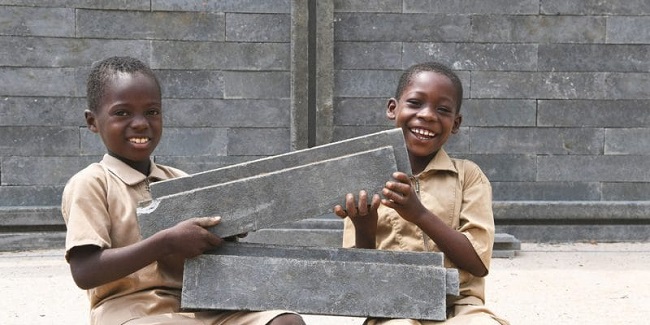
The Ivory Coast produces bricks for building schools from plastics
 |
Yaoundé - Many countries are troubled by too much plastic waste and simultaneously too few schools. A factory in East Africa has decided to tackle both problems at once - it manufactures bricks for building schools from old sandals, flip-flops, and tires. This is reported by the Thomson Reuters Foundation (TRF), which is the charitable arm of the Thomson Reuters news and information company.
The factory in Ivory Coast, the first of its kind in Africa, aims to produce enough bricks by 2021 to build 500 school classrooms. It received funding from the UNICEF and the Colombian company Conceptos Plásticos.
Landfills and oceans are flooded with millions of tons of plastic every year, prompting engineers and architects to come up with new ways to utilize this durable material. Fishermen from the Kenyan island of Lamu are constructing traditional boats from recycled plastic, and in Malawi, homes are being built using clay packed into plastic bags to save rapidly vanishing forests. Now, schools are being constructed from waste.
"It works like Lego," says UNICEF spokesperson in Ivory Coast, Sophie Chavanel. The interconnected blocks, which are cheaper and lighter than most traditional building materials, require no cement, are fire-resistant, and remain cool in hot weather, Chavanel states.
Building one classroom from these blocks will cost approximately $14,500 (almost 334,000 CZK). Ivory Coast desperately needs schools; in the country, less than one adult in two can read, and according to UNICEF, over 15,000 classrooms will be needed to educate all the children who currently have no place to learn. Most existing schools are made of clay, but due to the effects of sun and rain, they are crumbling.
Local women, who earn a living by collecting plastic waste, supply the factory with plastics. "We are turning plastic waste into opportunity. We want to help women out of poverty and create a better world for their children," explains Isabel Cristina Gamez, the director of Conceptos Plásticos, the company behind the school's construction.
In 2010, an estimated 4.4 million tons of plastic waste existed in Africa. Scientists fear that if no one intervenes, the amount of plastic waste could increase to 10.5 million tons by 2025. Globally, it is estimated that there are 32 million tons of plastic waste, not counting the amount that is properly recycled.
However, unrecycled plastic is increasingly being used by companies, says Cameroonian engineer Alain Elong, who founded his own collection and recycling facility, RED-PLAST, in 2012. "We started producing tiles from recycled plastic waste," he explains. These can also be used for paving roads where there is no asphalt.
The English translation is powered by AI tool. Switch to Czech to view the original text source.
0 comments
add comment











